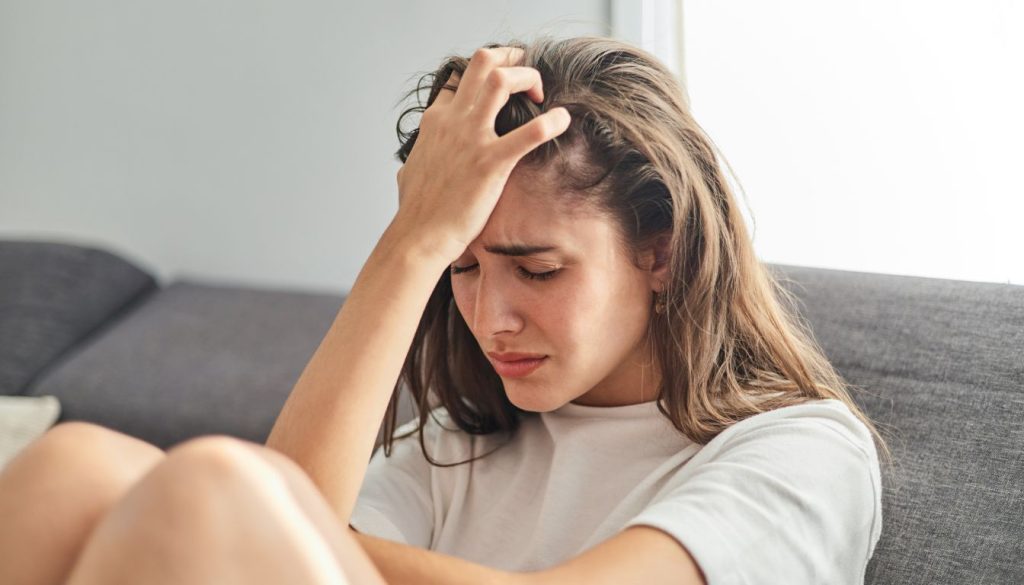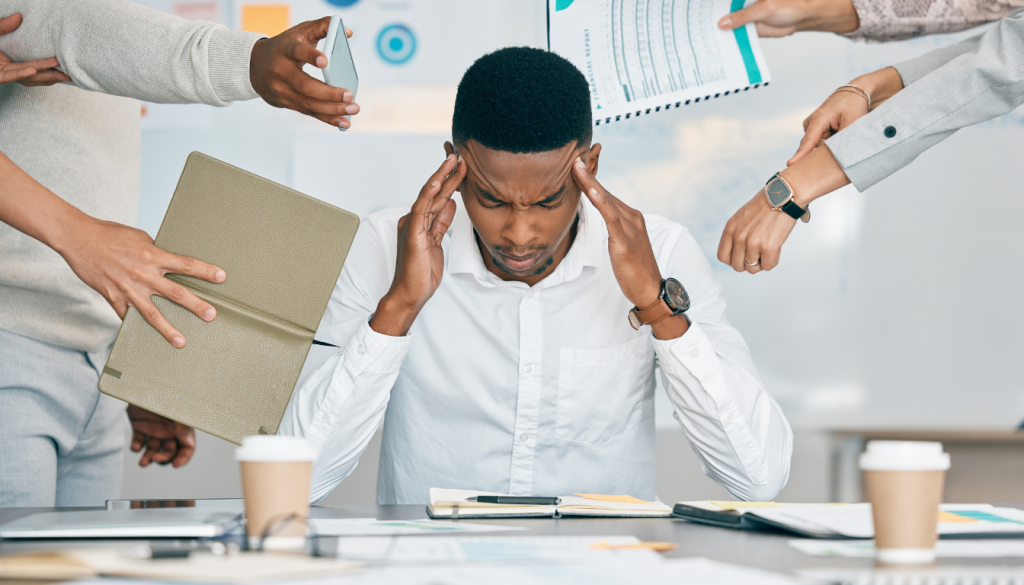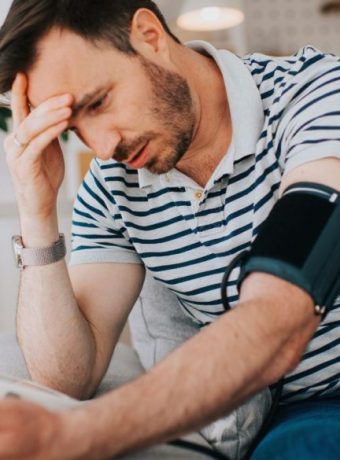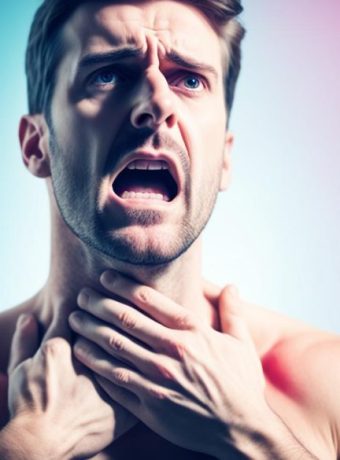Is Anxiety a Symptom of Stress?
Feeling stressed or anxious? Stress and anxiety can hit us all, causing things like not being able to sleep, stomach problems, or feeling mad. But is anxiety a symptom of stress? It’s important to see these two feelings clearly to take good care of yourselves.
Stress and anxiety often come together and may feel alike. However, they come from different places.
Figuring out if you feel stressed or anxious helps you get the right help. You’ll learn about the links between stress and anxiety, what makes them different, the signs, and ways to deal with both.
Key Takeaways
- Stress and anxiety often share similar symptoms but have distinct causes and origins.
- Stress is a response to external pressures and demands, while anxiety is an internal state of worry and fear.
- Anxiety disorders, such as Generalized Anxiety Disorder and Panic Disorder, are common, affecting 31% of Americans at some point in their lives.
- Effective management strategies for stress and anxiety include lifestyle changes, therapy, and, in some cases, medication.
- Seeking professional help is recommended if stress or anxiety significantly interferes with daily life.
What is Stress and Anxiety?
Stress and anxiety are mental health issues that often happen together. Stress is when something strains your body or mind.
This can happen because of things going on outside. It makes you feel tense, worried, or like too much is happening.
Your body reacts to these situations to help you deal with them.
What is Stress?
You might feel stressed when under lots of physical or mental pressure. This could be due to moving, a big work meeting, or a tight project deadline.
If this pressure continues for a long, it’s called chronic stress. It can come from a tough job or family problems.
What is Anxiety?
Anxiety is all about feeling scared, worried, or uneasy inside. Around 31% of Americans deal with an anxiety disorder at some point.
These can show up in many forms, from general anxiety to specific fears and phobias or fear of social situations.
Similarities and Differences
Stress and anxiety can seem similar because they both cause physical and mental health symptoms.
These can include:
- Not sleeping well
- Stomach issues
- Tight muscles
- Being easily annoyed.
But where they come from is different. Stress comes from the outside, while anxiety comes from inside fears and worries.
Knowing whether you’re more stressed or anxious is key. This can help you choose the best way to deal with stress and maintain your mental health.
Is Anxiety a Symptom of Stress?

Anxiety and stress go hand in hand. Stress can start or make anxiety worse. When you’re stressed, your body reacts by going into “fight-or-flight” mode.
This means it releases cortisol and adrenaline. These hormones can make you feel anxious, worried, or afraid.
Stress plays a big role in causing anxiety disorders.
For instance, generalized anxiety disorder makes you worry too much. This often comes from stressful events or constant pressure.
High stress levels can make conditions like panic or social anxiety disorder worse.
Although stress and anxiety look similar, they’re different. Stress comes from outside factors. Anxiety is about fear, worry, and nervousness inside you.1
Knowing this difference helps you figure out better ways to manage your mental health.
Sometimes, anxiety starts before stress. Constant worry can make your body respond to stress more over time.
In the U.S., around 8.2 million people have Generalized Anxiety Disorder. This makes them worry too much about daily things.
The best way to handle stress and anxiety is with lifestyle changes, talking to someone, and maybe medicine.
Clearly, anxiety and stress are related but not the same. Knowing the differences can help you beat stress and manage your mental health better.
Physical Symptoms of Stress and Anxiety
Stress and anxiety show themselves in many ways through our bodies. This can deeply affect our health and happiness.
Common stress signs are:
- Headaches
- Trouble sleeping
- Stomach problems (irritable bowel syndrome)
Anxiety is tied to conditions like asthma, heart troubles, and eyesight issues.
Common Stress Symptoms
High stress levels lead to:
- Your body tensing up with muscles
- Getting dizzy
- Sweating more
It can also change how you eat or sleep.
Long-term stress might bring on:
- Heart problems
- Obesity
- Stomach upsets
Common Anxiety Symptoms
Feelings of anxiety often come with:
- A fast heartbeat
- Chest tightness
- Hard breathing
People with anxiety might also feel like they can’t stop moving and everything is too much.
Anxiety has been tied to:
- Ulcers
- Asthma
- Heart attacks
And in older adults, it can make vision, stomach problems, and asthma worse.
It’s important to spot the signs of stress and anxiety early. This will help you reduce stress and stay healthy and happy.
Getting help from a doctor is a good step. They can help find the root of your symptoms and offer solutions.
Emotional and Psychological Symptoms
Stress and anxiety do more than make you feel bad physically; they affect your emotions and thoughts.
Emotional Impact of Stress
When stressed, we may get easily ticked off or feel overwhelmed. These feelings can spiral into bigger issues like depression and anxiety over time.
Psychological Effects of Anxiety
Anxiety messes with our minds differently. It can make us worry a lot, forget things, or have trouble concentrating.
This, too, can grow into depression or anxiety if left unchecked.
Both stress and anxiety affect your emotional stability. They cause a mix of feelings and potentially serious mental health problems.
Knowing this and taking action early is key to staying well.
Identifying the Trigger
Distinguishing stress and anxiety often depend on having a clear trigger. Stress may come from big changes like moving or small things like work meetings.1
Meanwhile, those with PTSD might be set off by certain sights or sounds.
Stressors and Specific Events
Pinpointing the cause of your stress makes it easier to deal with. It could be a work deadline, a fight with family, or a big life event.
Once you know what’s stressing you, you can start to work on handling it better.
Generalized Anxiety Without a Clear Cause
Generalized anxiety disorder leads to ongoing worry about daily activities. But the actual source of this anxiety may remain a mystery.
This lack of clarity often makes coping more difficult.
A recent study suggests this disorder might be linked to brain structure variations.
Chronic Stress and Anxiety Disorders
Stress and anxiety are closely linked. But if stress goes on for too long without being managed, it can lead to anxiety disorders.
These are mental health problems that can really affect how you live in a big way. They can affect your life, your relationships, and how you feel.
Types of Anxiety Disorders
There are many kinds of anxiety disorders. Each one has its own signs and symptoms. Some well-known types of anxiety disorders are:
1. Generalized Anxiety Disorder (GAD)
This disorder makes you worry a lot all the time. It happens almost every day for at least six months. About 6.8 million adults in the U.S., or about 3.1% of people, are affected.
2. Panic Disorder
It means you have sudden panic attacks and very scary moments. You feel your heart race, find yourself breathing hard, and might shake.
Around 6 million adults, or 2.7% of the population, have panic disorder.
3. Social Anxiety Disorder
This is when you’re very afraid or anxious in social settings. It can make you avoid being with others.
About 15 million adults in the U.S., or 6.8% of the population, have this disorder.
4. Specific Phobias
These are strong and irrational fears of certain things, like heights or animals. About 19 million adults have these fears, or 8.7% of the population.
It’s good to know that women are more likely to develop generalized anxiety disorder than men.
Anxiety problems can start early, even in childhood or the teenage years, and last into adulthood.
Too much stress and anxiety can cause many issues.
These can include:
- Depression
- Using drugs
- Not sleeping well
- Stomach problems
- Lots of pain
- Staying away from social events
- Suicidal thoughts
It’s very important to get help for anxiety early. Treating it sooner is much better.
Plus, people with anxiety disorders often also have symptoms of depression. It shows how important it is to handle mental health as a whole.
Risk Factors and Causes

Stress and anxiety can come from a mix of things, like tough life events, genes, health issues, and using substances. Knowing these risk factors helps find better ways to stop and handle stress and anxiety.
Trauma and Life Experiences
Going through severe events like violence or abuse before age 21 raises the chances of having anxiety disorders later, like PTSD.
These tough times might make some teens and young adults hurt themselves to deal with, which makes anxiety and mental health problems worse.9
Genetics and Family History
If your family has a history of anxiety, you might be at risk, too, as genes play a part in this condition.
Research also shows that women are more likely to feel anxious and develop anxiety disorders than men.
Women have higher rates of many anxiety disorders like panic disorders, agoraphobia, and PTSD.
Feeling like your gender doesn’t match can also raise the chances of anxiety, depression, using drugs, or thinking about suicide.
Medical Conditions and Substance Use
Certain health problems and medicines can make anxiety more likely. Having depression can also mean you’re more likely to have anxiety.
Those with anxiety disorders are often found to misuse drugs or alcohol, trying to deal with stress in social situations.
This can lead to more issues and higher anxiety levels.
Some medicines, like those with caffeine or for asthma, ADHD, or Parkinson’s, can have side effects that look like anxiety.
Knowing these factors can lead to better ways for people and doctors to tackle stress and anxiety.
By dealing with the causes, people can work on keeping their mental health strong and lowering how much these issues affect them daily.
How to deal with Stress and Anxiety

You can deal with stress and anxiety by making lifestyle changes, getting therapy, and considering medication.
Lifestyle Changes
Changing your lifestyle is key. Cut back on caffeine and alcohol, sleep enough, exercise, try meditation, and keep up with hobbies and friends.
Doing these things daily can lessen your stress and anxiety.
Therapy and Counseling
If a change in lifestyle doesn’t work, therapy can help a lot.
Therapists use CBT to change how you think, teach you practical ways to cope, and find why you’re anxious.
For people with heavy anxiety issues, like GAD, panic disorder, or PTSD, therapy should be the first choice.
Medication Options
Sometimes, medications are needed, too. Antidepressants, anti-anxiety drugs, or beta-blockers can help along with therapy.
Working closely with a doctor to find the right medication is important. Using medications correctly and with other techniques can improve your life.
By taking a full approach to stress and anxiety, you can get better. By dealing with the body and mind sides, you can manage them well and feel in charge again.
When to Seek Professional Help
If you find anxiety or stress affecting your daily life, it’s time to get help. Signs it’s time to talk to a doctor or therapist include:
- Persistent worry, nervousness, or sadness for 2 weeks or more
- Physical symptoms like headaches, high blood pressure, and sleep troubles
- Having a hard time with everyday tasks or making decisions due to your feelings
- Feeling moody and less able to enjoy activities or be social
- Anxiety that really stops you from traveling for work or handling daily duties
Starting treatment early is key to managing anxiety and stress. A mental health expert can offer you ways to handle your feelings. This might include therapy, medicine, or a mix of both.
If things are really bad or you’re thinking about hurting yourself, reach out for help. Call 988 Suicide & Crisis Lifeline or go to 988lifeline.org for fast support.
You can also check out resources like the National Institute of Mental Health (NIMH) anxiety page. They can help you find the care you need.
Wrapping Up
Stress and anxiety are closely linked but have different mental states. Stress comes from the outside, like work or school pressure.
Anxiety is an inner fear or worry that can happen for no clear reason. Both bring physical and emotional signs, but knowing the differences is key to coping well.
Stress is often short-lived, reacting to a clear danger. On the other hand, anxiety can persist without a known cause.
When stressed, our bodies prepare to fight or run. This causes your heart to beat faster, among other reactions such as shallow breathing or stomach problems.
If you notice stress or anxiety becoming a real issue, such as extreme worry or self-harm thoughts, it’s time for help. Understanding these mental issues lets you create a plan that works for you. This may involve calming activities, staying active, and talking openly about your worries.
FAQ
What is the difference between stress and anxiety?
Stress comes from outside pressures, while anxiety is fear you feel inside. Both can make your body and mind feel bad. Stress happens from certain events, and anxiety can sneak up without warning.
Can stress lead to anxiety?
Long-lasting stress that’s not dealt with can cause serious anxiety problems. Stressful situations can make your body react quickly, giving you anxious feelings. If these stressors stick around, it can turn into long-term anxiety.
What are the common symptoms of stress and anxiety?
Stress and anxiety have similar effects on your body, like dizziness and sleep problems. Also, they make you feel overwhelmed emotionally.
How can I identify the trigger for my stress or anxiety?
Stress is usually caused by a specific event or issue that worries you. Anxiety might pop up for no clear reason, causing a general sense of fear. Knowing what causes your stress or anxiety can help you deal with it.
When should I seek professional help for stress or anxiety?
If stress or anxiety starts messing with your life, get help. Signs include constant physical symptoms and emotions you can’t control. They should affect how you live.




